An Analysis of Leadership Styles and Employee Satisfaction
VerifiedAdded on 2023/01/10
|11
|3005
|46
Report
AI Summary
This report investigates the relationship between leadership styles and employee satisfaction, focusing on a study conducted on Tesco. The research explores various leadership approaches, including democratic and autocratic styles, and their effects on employee morale and productivity. The report examines the rationale, objectives, and research questions, along with a literature review discussing different leadership styles. The methodology section outlines both qualitative and quantitative research methods, data collection techniques, and data analysis strategies. The findings highlight the importance of leadership in enhancing business operations and employee satisfaction, with a particular emphasis on the effectiveness of democratic leadership. The report also addresses research implications and ethical considerations, concluding that appropriate leadership styles are crucial for organizational success and employee well-being. The report emphasizes the importance of ethical practices and the authenticity of information in conducting research. The analysis uses thematic analysis, frequency tables, graphs, and charts to present its findings.
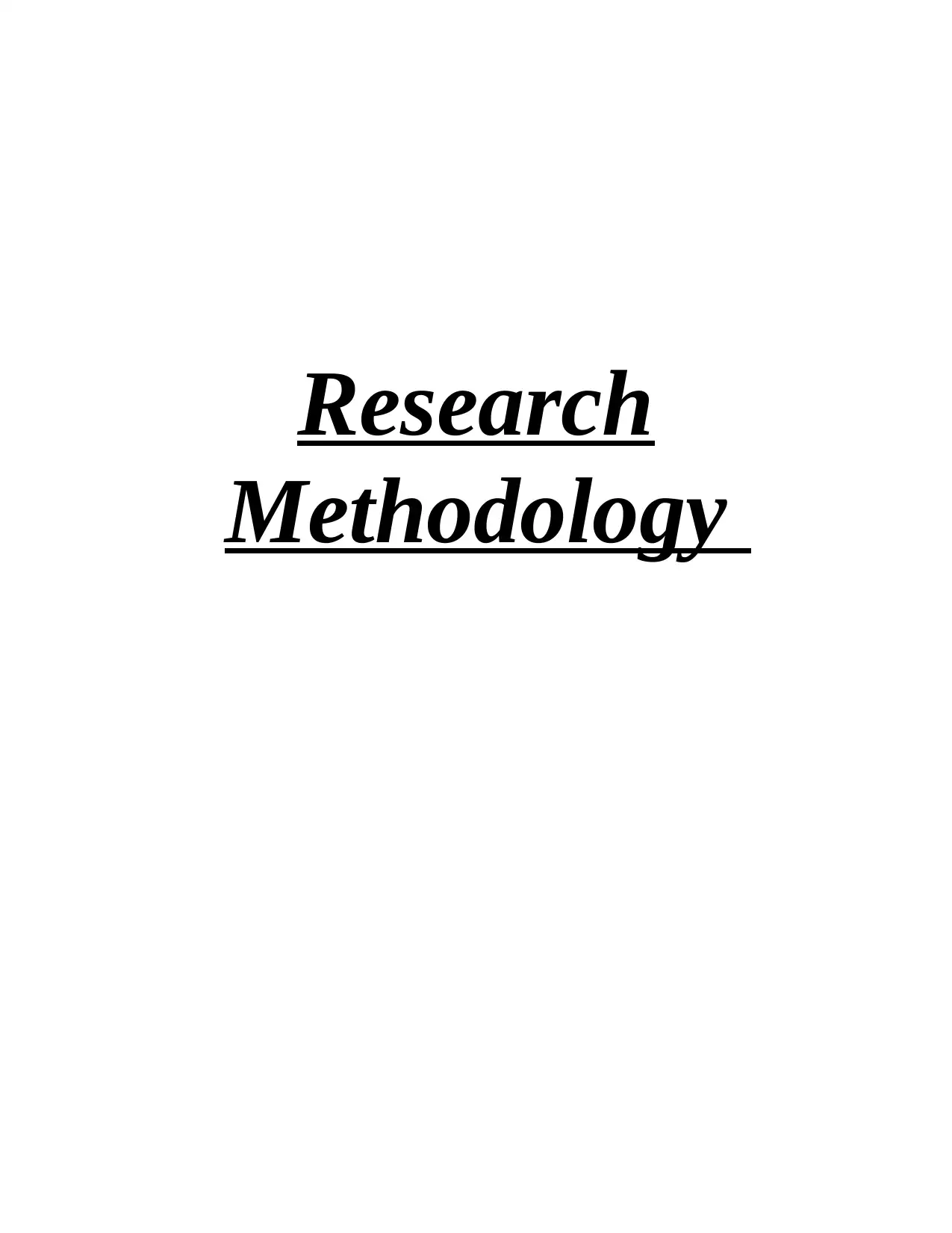
Research
Methodology
Methodology
Paraphrase This Document
Need a fresh take? Get an instant paraphrase of this document with our AI Paraphraser
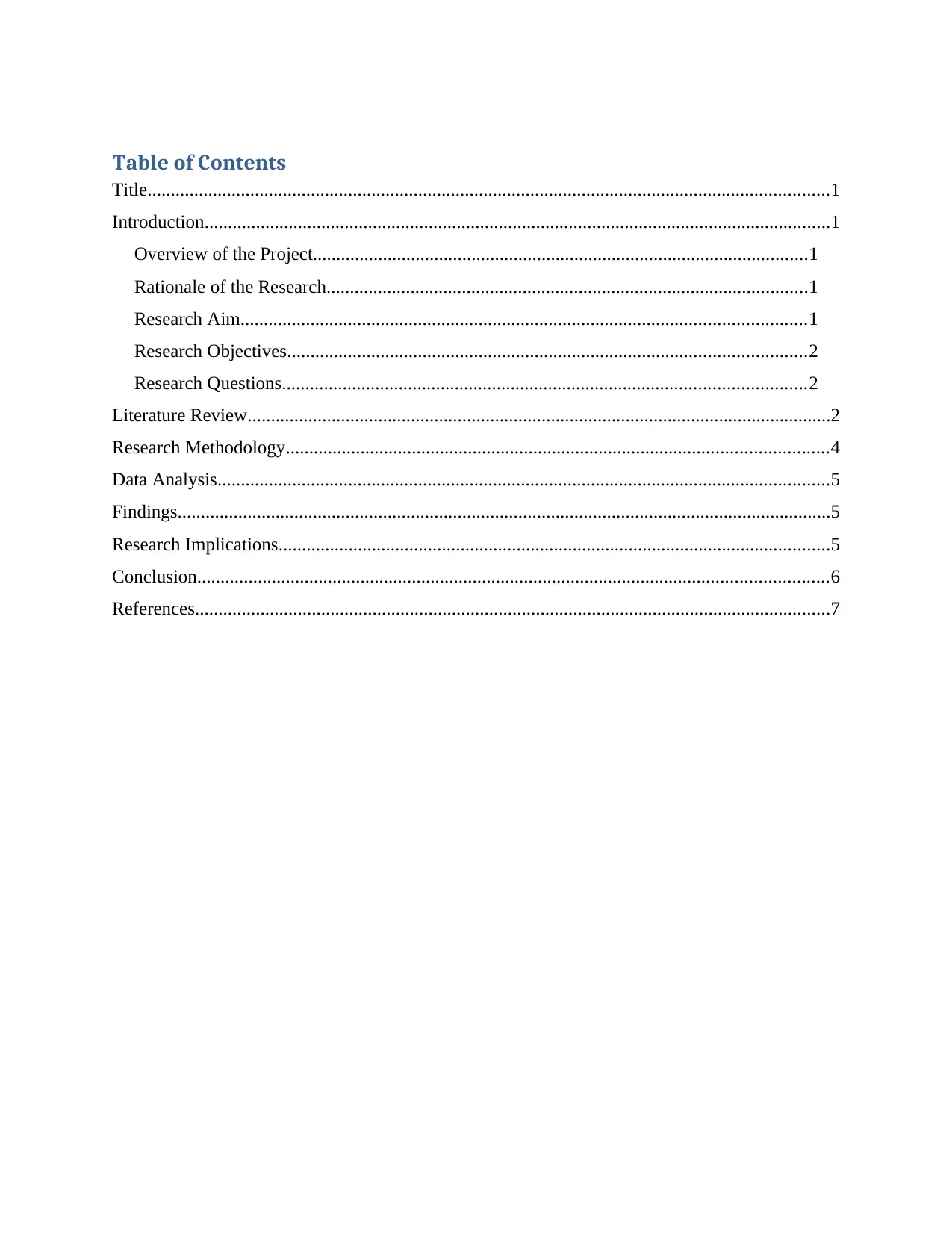
Table of Contents
Title..................................................................................................................................................1
Introduction......................................................................................................................................1
Overview of the Project..........................................................................................................1
Rationale of the Research.......................................................................................................1
Research Aim.........................................................................................................................1
Research Objectives...............................................................................................................2
Research Questions................................................................................................................2
Literature Review.............................................................................................................................2
Research Methodology....................................................................................................................4
Data Analysis...................................................................................................................................5
Findings............................................................................................................................................5
Research Implications......................................................................................................................5
Conclusion.......................................................................................................................................6
References........................................................................................................................................7
Title..................................................................................................................................................1
Introduction......................................................................................................................................1
Overview of the Project..........................................................................................................1
Rationale of the Research.......................................................................................................1
Research Aim.........................................................................................................................1
Research Objectives...............................................................................................................2
Research Questions................................................................................................................2
Literature Review.............................................................................................................................2
Research Methodology....................................................................................................................4
Data Analysis...................................................................................................................................5
Findings............................................................................................................................................5
Research Implications......................................................................................................................5
Conclusion.......................................................................................................................................6
References........................................................................................................................................7

⊘ This is a preview!⊘
Do you want full access?
Subscribe today to unlock all pages.

Trusted by 1+ million students worldwide
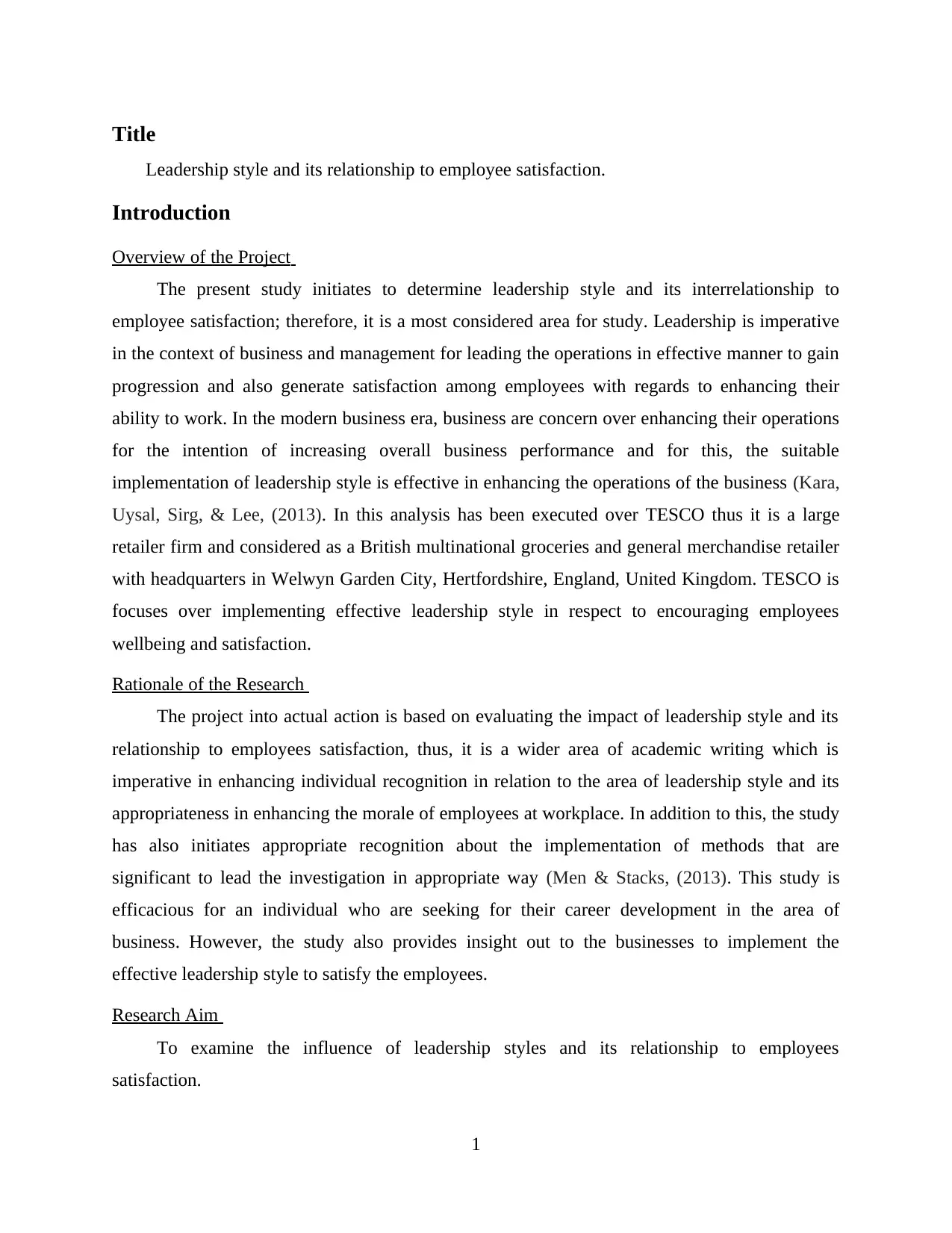
Title
Leadership style and its relationship to employee satisfaction.
Introduction
Overview of the Project
The present study initiates to determine leadership style and its interrelationship to
employee satisfaction; therefore, it is a most considered area for study. Leadership is imperative
in the context of business and management for leading the operations in effective manner to gain
progression and also generate satisfaction among employees with regards to enhancing their
ability to work. In the modern business era, business are concern over enhancing their operations
for the intention of increasing overall business performance and for this, the suitable
implementation of leadership style is effective in enhancing the operations of the business (Kara,
Uysal, Sirg, & Lee, (2013). In this analysis has been executed over TESCO thus it is a large
retailer firm and considered as a British multinational groceries and general merchandise retailer
with headquarters in Welwyn Garden City, Hertfordshire, England, United Kingdom. TESCO is
focuses over implementing effective leadership style in respect to encouraging employees
wellbeing and satisfaction.
Rationale of the Research
The project into actual action is based on evaluating the impact of leadership style and its
relationship to employees satisfaction, thus, it is a wider area of academic writing which is
imperative in enhancing individual recognition in relation to the area of leadership style and its
appropriateness in enhancing the morale of employees at workplace. In addition to this, the study
has also initiates appropriate recognition about the implementation of methods that are
significant to lead the investigation in appropriate way (Men & Stacks, (2013). This study is
efficacious for an individual who are seeking for their career development in the area of
business. However, the study also provides insight out to the businesses to implement the
effective leadership style to satisfy the employees.
Research Aim
To examine the influence of leadership styles and its relationship to employees
satisfaction.
1
Leadership style and its relationship to employee satisfaction.
Introduction
Overview of the Project
The present study initiates to determine leadership style and its interrelationship to
employee satisfaction; therefore, it is a most considered area for study. Leadership is imperative
in the context of business and management for leading the operations in effective manner to gain
progression and also generate satisfaction among employees with regards to enhancing their
ability to work. In the modern business era, business are concern over enhancing their operations
for the intention of increasing overall business performance and for this, the suitable
implementation of leadership style is effective in enhancing the operations of the business (Kara,
Uysal, Sirg, & Lee, (2013). In this analysis has been executed over TESCO thus it is a large
retailer firm and considered as a British multinational groceries and general merchandise retailer
with headquarters in Welwyn Garden City, Hertfordshire, England, United Kingdom. TESCO is
focuses over implementing effective leadership style in respect to encouraging employees
wellbeing and satisfaction.
Rationale of the Research
The project into actual action is based on evaluating the impact of leadership style and its
relationship to employees satisfaction, thus, it is a wider area of academic writing which is
imperative in enhancing individual recognition in relation to the area of leadership style and its
appropriateness in enhancing the morale of employees at workplace. In addition to this, the study
has also initiates appropriate recognition about the implementation of methods that are
significant to lead the investigation in appropriate way (Men & Stacks, (2013). This study is
efficacious for an individual who are seeking for their career development in the area of
business. However, the study also provides insight out to the businesses to implement the
effective leadership style to satisfy the employees.
Research Aim
To examine the influence of leadership styles and its relationship to employees
satisfaction.
1
Paraphrase This Document
Need a fresh take? Get an instant paraphrase of this document with our AI Paraphraser
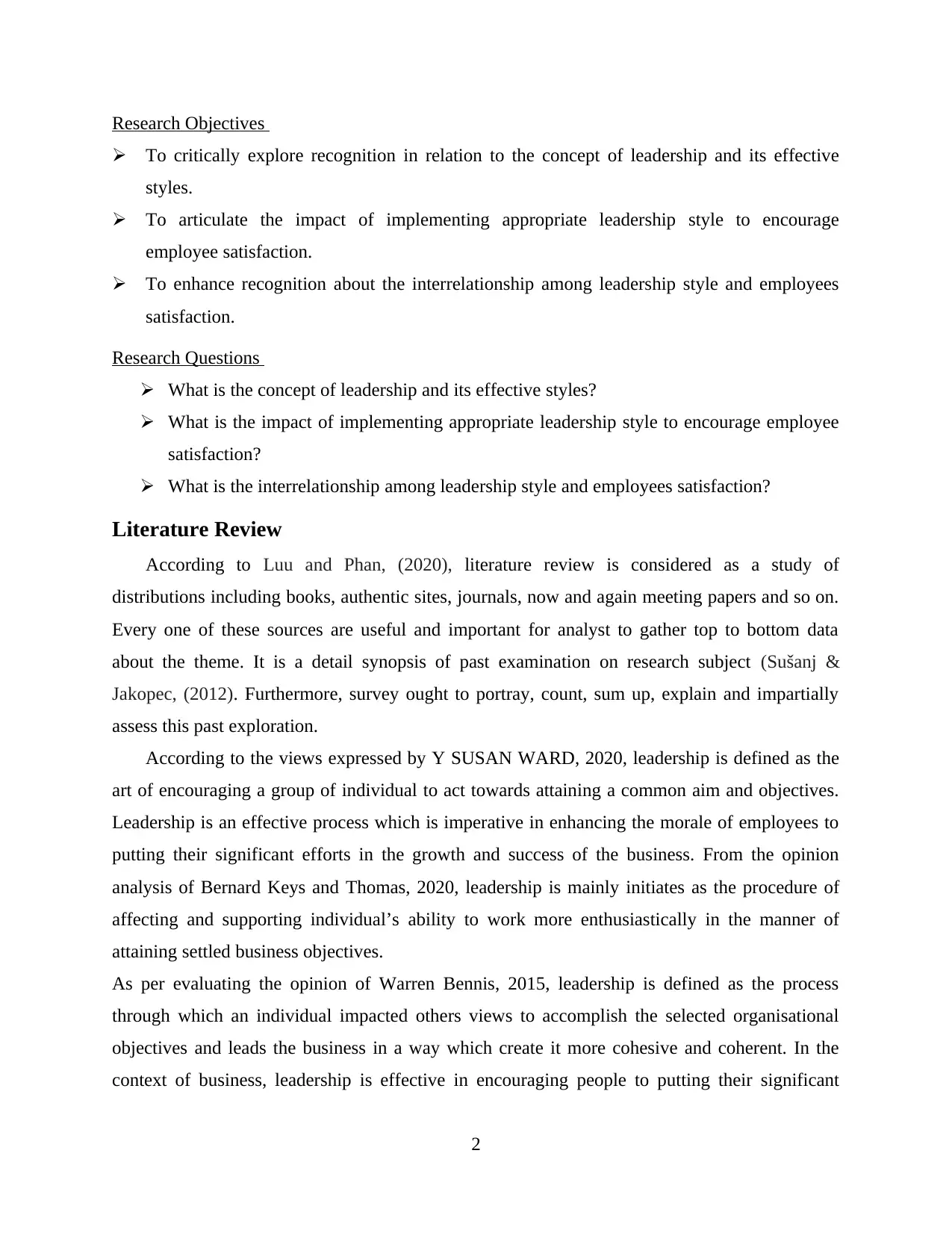
Research Objectives
To critically explore recognition in relation to the concept of leadership and its effective
styles.
To articulate the impact of implementing appropriate leadership style to encourage
employee satisfaction.
To enhance recognition about the interrelationship among leadership style and employees
satisfaction.
Research Questions
What is the concept of leadership and its effective styles?
What is the impact of implementing appropriate leadership style to encourage employee
satisfaction?
What is the interrelationship among leadership style and employees satisfaction?
Literature Review
According to Luu and Phan, (2020), literature review is considered as a study of
distributions including books, authentic sites, journals, now and again meeting papers and so on.
Every one of these sources are useful and important for analyst to gather top to bottom data
about the theme. It is a detail synopsis of past examination on research subject (Sušanj &
Jakopec, (2012). Furthermore, survey ought to portray, count, sum up, explain and impartially
assess this past exploration.
According to the views expressed by Y SUSAN WARD, 2020, leadership is defined as the
art of encouraging a group of individual to act towards attaining a common aim and objectives.
Leadership is an effective process which is imperative in enhancing the morale of employees to
putting their significant efforts in the growth and success of the business. From the opinion
analysis of Bernard Keys and Thomas, 2020, leadership is mainly initiates as the procedure of
affecting and supporting individual’s ability to work more enthusiastically in the manner of
attaining settled business objectives.
As per evaluating the opinion of Warren Bennis, 2015, leadership is defined as the process
through which an individual impacted others views to accomplish the selected organisational
objectives and leads the business in a way which create it more cohesive and coherent. In the
context of business, leadership is effective in encouraging people to putting their significant
2
To critically explore recognition in relation to the concept of leadership and its effective
styles.
To articulate the impact of implementing appropriate leadership style to encourage
employee satisfaction.
To enhance recognition about the interrelationship among leadership style and employees
satisfaction.
Research Questions
What is the concept of leadership and its effective styles?
What is the impact of implementing appropriate leadership style to encourage employee
satisfaction?
What is the interrelationship among leadership style and employees satisfaction?
Literature Review
According to Luu and Phan, (2020), literature review is considered as a study of
distributions including books, authentic sites, journals, now and again meeting papers and so on.
Every one of these sources are useful and important for analyst to gather top to bottom data
about the theme. It is a detail synopsis of past examination on research subject (Sušanj &
Jakopec, (2012). Furthermore, survey ought to portray, count, sum up, explain and impartially
assess this past exploration.
According to the views expressed by Y SUSAN WARD, 2020, leadership is defined as the
art of encouraging a group of individual to act towards attaining a common aim and objectives.
Leadership is an effective process which is imperative in enhancing the morale of employees to
putting their significant efforts in the growth and success of the business. From the opinion
analysis of Bernard Keys and Thomas, 2020, leadership is mainly initiates as the procedure of
affecting and supporting individual’s ability to work more enthusiastically in the manner of
attaining settled business objectives.
As per evaluating the opinion of Warren Bennis, 2015, leadership is defined as the process
through which an individual impacted others views to accomplish the selected organisational
objectives and leads the business in a way which create it more cohesive and coherent. In the
context of business, leadership is effective in encouraging people to putting their significant
2
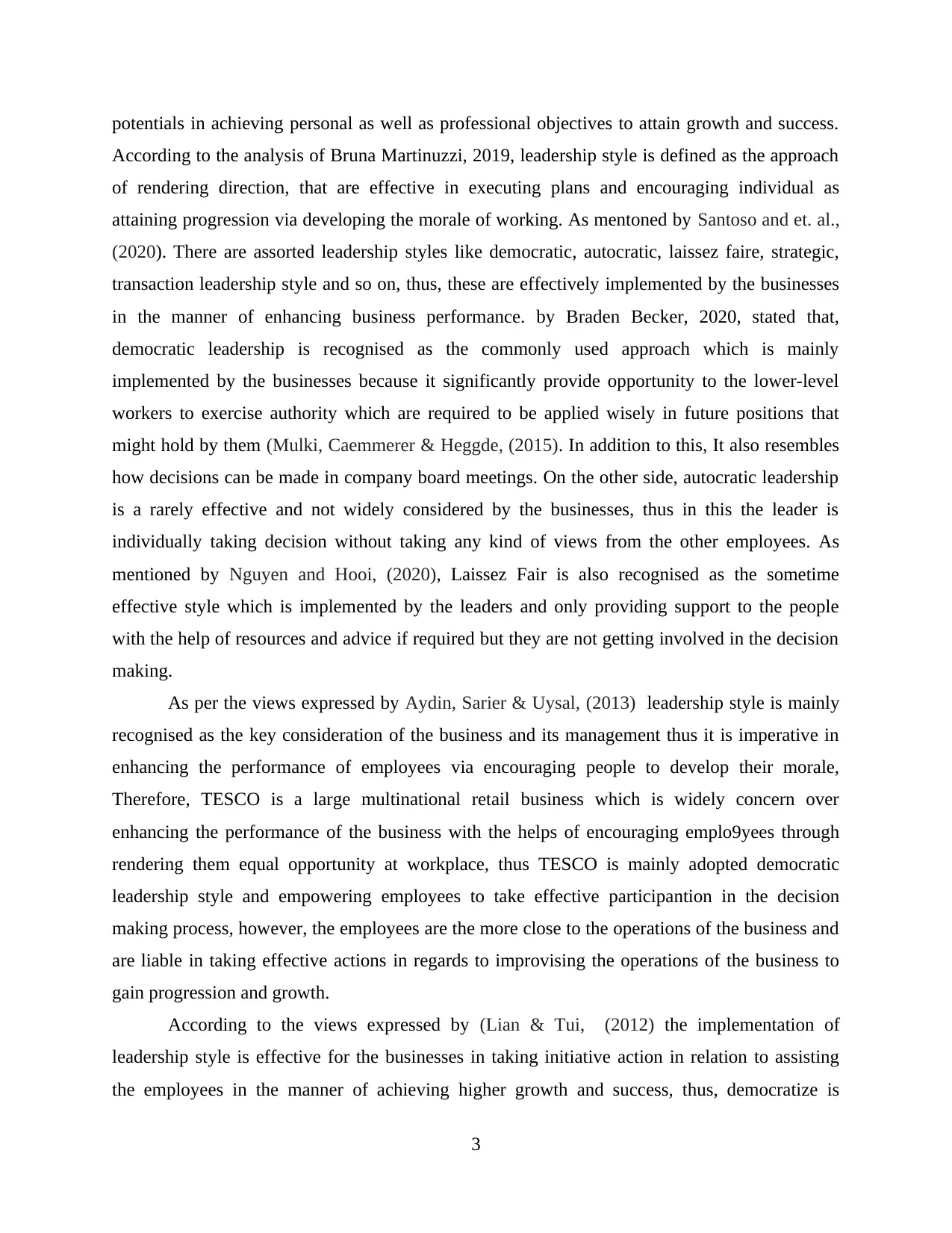
potentials in achieving personal as well as professional objectives to attain growth and success.
According to the analysis of Bruna Martinuzzi, 2019, leadership style is defined as the approach
of rendering direction, that are effective in executing plans and encouraging individual as
attaining progression via developing the morale of working. As mentoned by Santoso and et. al.,
(2020). There are assorted leadership styles like democratic, autocratic, laissez faire, strategic,
transaction leadership style and so on, thus, these are effectively implemented by the businesses
in the manner of enhancing business performance. by Braden Becker, 2020, stated that,
democratic leadership is recognised as the commonly used approach which is mainly
implemented by the businesses because it significantly provide opportunity to the lower-level
workers to exercise authority which are required to be applied wisely in future positions that
might hold by them (Mulki, Caemmerer & Heggde, (2015). In addition to this, It also resembles
how decisions can be made in company board meetings. On the other side, autocratic leadership
is a rarely effective and not widely considered by the businesses, thus in this the leader is
individually taking decision without taking any kind of views from the other employees. As
mentioned by Nguyen and Hooi, (2020), Laissez Fair is also recognised as the sometime
effective style which is implemented by the leaders and only providing support to the people
with the help of resources and advice if required but they are not getting involved in the decision
making.
As per the views expressed by Aydin, Sarier & Uysal, (2013) leadership style is mainly
recognised as the key consideration of the business and its management thus it is imperative in
enhancing the performance of employees via encouraging people to develop their morale,
Therefore, TESCO is a large multinational retail business which is widely concern over
enhancing the performance of the business with the helps of encouraging emplo9yees through
rendering them equal opportunity at workplace, thus TESCO is mainly adopted democratic
leadership style and empowering employees to take effective participantion in the decision
making process, however, the employees are the more close to the operations of the business and
are liable in taking effective actions in regards to improvising the operations of the business to
gain progression and growth.
According to the views expressed by (Lian & Tui, (2012) the implementation of
leadership style is effective for the businesses in taking initiative action in relation to assisting
the employees in the manner of achieving higher growth and success, thus, democratize is
3
According to the analysis of Bruna Martinuzzi, 2019, leadership style is defined as the approach
of rendering direction, that are effective in executing plans and encouraging individual as
attaining progression via developing the morale of working. As mentoned by Santoso and et. al.,
(2020). There are assorted leadership styles like democratic, autocratic, laissez faire, strategic,
transaction leadership style and so on, thus, these are effectively implemented by the businesses
in the manner of enhancing business performance. by Braden Becker, 2020, stated that,
democratic leadership is recognised as the commonly used approach which is mainly
implemented by the businesses because it significantly provide opportunity to the lower-level
workers to exercise authority which are required to be applied wisely in future positions that
might hold by them (Mulki, Caemmerer & Heggde, (2015). In addition to this, It also resembles
how decisions can be made in company board meetings. On the other side, autocratic leadership
is a rarely effective and not widely considered by the businesses, thus in this the leader is
individually taking decision without taking any kind of views from the other employees. As
mentioned by Nguyen and Hooi, (2020), Laissez Fair is also recognised as the sometime
effective style which is implemented by the leaders and only providing support to the people
with the help of resources and advice if required but they are not getting involved in the decision
making.
As per the views expressed by Aydin, Sarier & Uysal, (2013) leadership style is mainly
recognised as the key consideration of the business and its management thus it is imperative in
enhancing the performance of employees via encouraging people to develop their morale,
Therefore, TESCO is a large multinational retail business which is widely concern over
enhancing the performance of the business with the helps of encouraging emplo9yees through
rendering them equal opportunity at workplace, thus TESCO is mainly adopted democratic
leadership style and empowering employees to take effective participantion in the decision
making process, however, the employees are the more close to the operations of the business and
are liable in taking effective actions in regards to improvising the operations of the business to
gain progression and growth.
According to the views expressed by (Lian & Tui, (2012) the implementation of
leadership style is effective for the businesses in taking initiative action in relation to assisting
the employees in the manner of achieving higher growth and success, thus, democratize is
3
⊘ This is a preview!⊘
Do you want full access?
Subscribe today to unlock all pages.

Trusted by 1+ million students worldwide
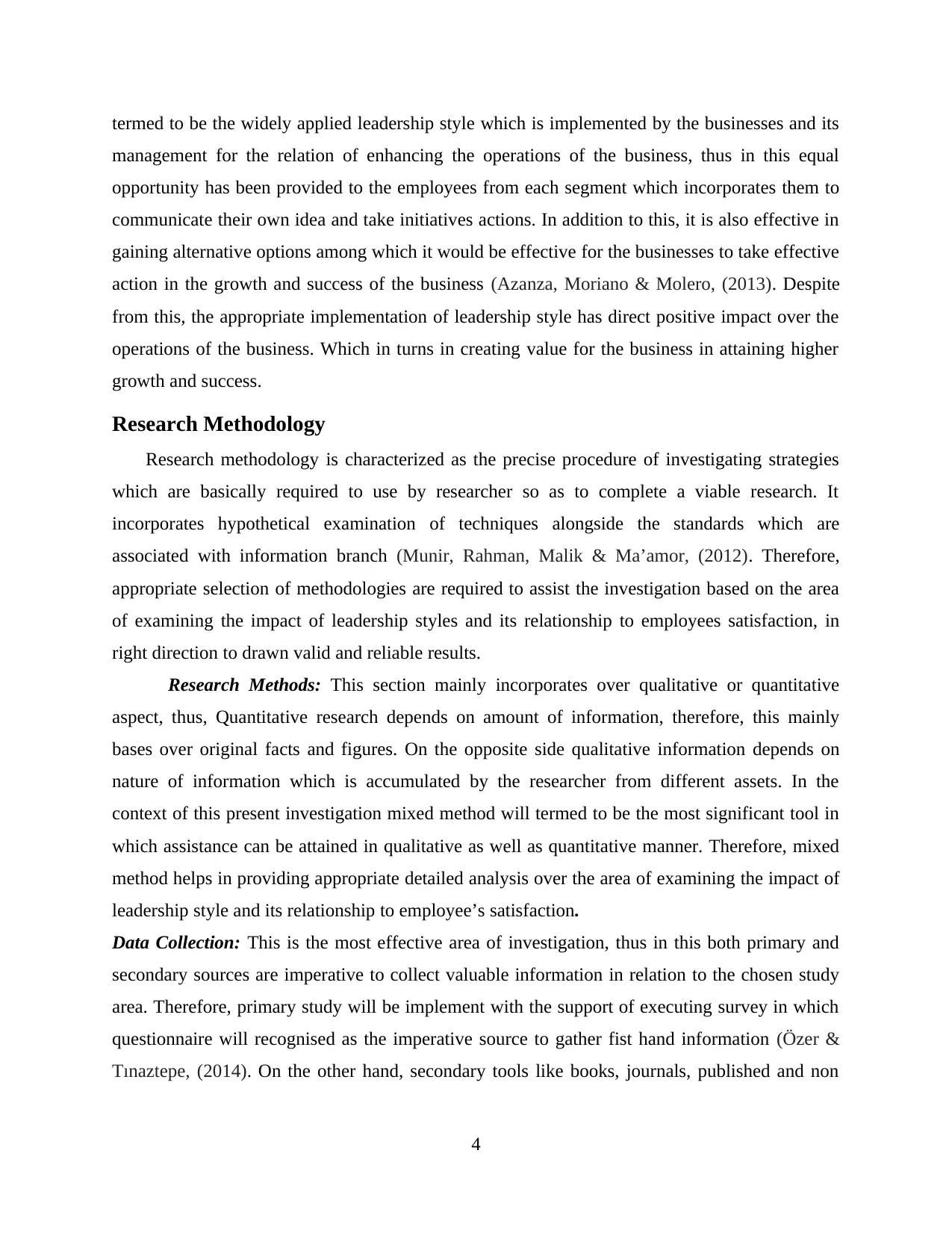
termed to be the widely applied leadership style which is implemented by the businesses and its
management for the relation of enhancing the operations of the business, thus in this equal
opportunity has been provided to the employees from each segment which incorporates them to
communicate their own idea and take initiatives actions. In addition to this, it is also effective in
gaining alternative options among which it would be effective for the businesses to take effective
action in the growth and success of the business (Azanza, Moriano & Molero, (2013). Despite
from this, the appropriate implementation of leadership style has direct positive impact over the
operations of the business. Which in turns in creating value for the business in attaining higher
growth and success.
Research Methodology
Research methodology is characterized as the precise procedure of investigating strategies
which are basically required to use by researcher so as to complete a viable research. It
incorporates hypothetical examination of techniques alongside the standards which are
associated with information branch (Munir, Rahman, Malik & Ma’amor, (2012). Therefore,
appropriate selection of methodologies are required to assist the investigation based on the area
of examining the impact of leadership styles and its relationship to employees satisfaction, in
right direction to drawn valid and reliable results.
Research Methods: This section mainly incorporates over qualitative or quantitative
aspect, thus, Quantitative research depends on amount of information, therefore, this mainly
bases over original facts and figures. On the opposite side qualitative information depends on
nature of information which is accumulated by the researcher from different assets. In the
context of this present investigation mixed method will termed to be the most significant tool in
which assistance can be attained in qualitative as well as quantitative manner. Therefore, mixed
method helps in providing appropriate detailed analysis over the area of examining the impact of
leadership style and its relationship to employee’s satisfaction.
Data Collection: This is the most effective area of investigation, thus in this both primary and
secondary sources are imperative to collect valuable information in relation to the chosen study
area. Therefore, primary study will be implement with the support of executing survey in which
questionnaire will recognised as the imperative source to gather fist hand information (Özer &
Tınaztepe, (2014). On the other hand, secondary tools like books, journals, published and non
4
management for the relation of enhancing the operations of the business, thus in this equal
opportunity has been provided to the employees from each segment which incorporates them to
communicate their own idea and take initiatives actions. In addition to this, it is also effective in
gaining alternative options among which it would be effective for the businesses to take effective
action in the growth and success of the business (Azanza, Moriano & Molero, (2013). Despite
from this, the appropriate implementation of leadership style has direct positive impact over the
operations of the business. Which in turns in creating value for the business in attaining higher
growth and success.
Research Methodology
Research methodology is characterized as the precise procedure of investigating strategies
which are basically required to use by researcher so as to complete a viable research. It
incorporates hypothetical examination of techniques alongside the standards which are
associated with information branch (Munir, Rahman, Malik & Ma’amor, (2012). Therefore,
appropriate selection of methodologies are required to assist the investigation based on the area
of examining the impact of leadership styles and its relationship to employees satisfaction, in
right direction to drawn valid and reliable results.
Research Methods: This section mainly incorporates over qualitative or quantitative
aspect, thus, Quantitative research depends on amount of information, therefore, this mainly
bases over original facts and figures. On the opposite side qualitative information depends on
nature of information which is accumulated by the researcher from different assets. In the
context of this present investigation mixed method will termed to be the most significant tool in
which assistance can be attained in qualitative as well as quantitative manner. Therefore, mixed
method helps in providing appropriate detailed analysis over the area of examining the impact of
leadership style and its relationship to employee’s satisfaction.
Data Collection: This is the most effective area of investigation, thus in this both primary and
secondary sources are imperative to collect valuable information in relation to the chosen study
area. Therefore, primary study will be implement with the support of executing survey in which
questionnaire will recognised as the imperative source to gather fist hand information (Özer &
Tınaztepe, (2014). On the other hand, secondary tools like books, journals, published and non
4
Paraphrase This Document
Need a fresh take? Get an instant paraphrase of this document with our AI Paraphraser
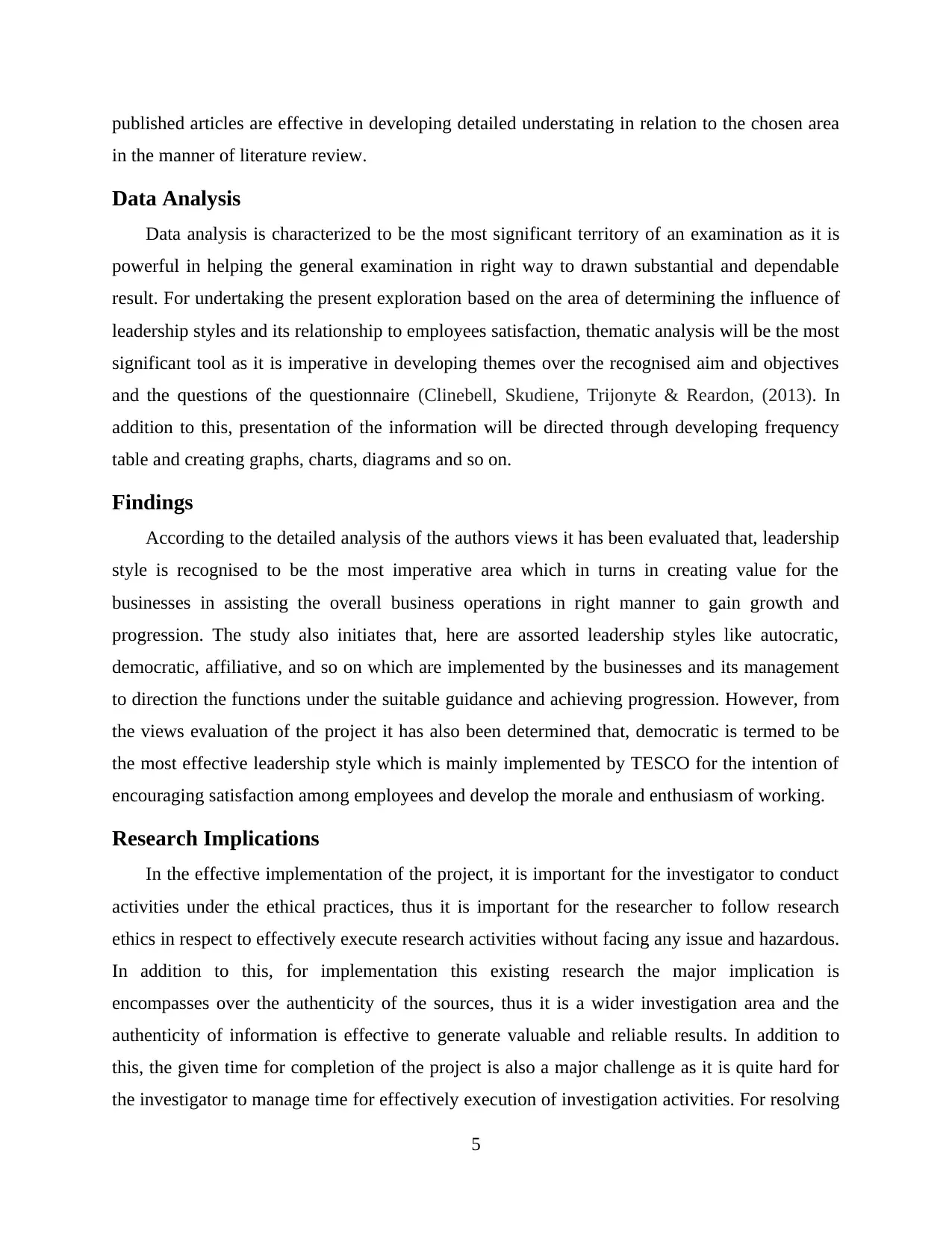
published articles are effective in developing detailed understating in relation to the chosen area
in the manner of literature review.
Data Analysis
Data analysis is characterized to be the most significant territory of an examination as it is
powerful in helping the general examination in right way to drawn substantial and dependable
result. For undertaking the present exploration based on the area of determining the influence of
leadership styles and its relationship to employees satisfaction, thematic analysis will be the most
significant tool as it is imperative in developing themes over the recognised aim and objectives
and the questions of the questionnaire (Clinebell, Skudiene, Trijonyte & Reardon, (2013). In
addition to this, presentation of the information will be directed through developing frequency
table and creating graphs, charts, diagrams and so on.
Findings
According to the detailed analysis of the authors views it has been evaluated that, leadership
style is recognised to be the most imperative area which in turns in creating value for the
businesses in assisting the overall business operations in right manner to gain growth and
progression. The study also initiates that, here are assorted leadership styles like autocratic,
democratic, affiliative, and so on which are implemented by the businesses and its management
to direction the functions under the suitable guidance and achieving progression. However, from
the views evaluation of the project it has also been determined that, democratic is termed to be
the most effective leadership style which is mainly implemented by TESCO for the intention of
encouraging satisfaction among employees and develop the morale and enthusiasm of working.
Research Implications
In the effective implementation of the project, it is important for the investigator to conduct
activities under the ethical practices, thus it is important for the researcher to follow research
ethics in respect to effectively execute research activities without facing any issue and hazardous.
In addition to this, for implementation this existing research the major implication is
encompasses over the authenticity of the sources, thus it is a wider investigation area and the
authenticity of information is effective to generate valuable and reliable results. In addition to
this, the given time for completion of the project is also a major challenge as it is quite hard for
the investigator to manage time for effectively execution of investigation activities. For resolving
5
in the manner of literature review.
Data Analysis
Data analysis is characterized to be the most significant territory of an examination as it is
powerful in helping the general examination in right way to drawn substantial and dependable
result. For undertaking the present exploration based on the area of determining the influence of
leadership styles and its relationship to employees satisfaction, thematic analysis will be the most
significant tool as it is imperative in developing themes over the recognised aim and objectives
and the questions of the questionnaire (Clinebell, Skudiene, Trijonyte & Reardon, (2013). In
addition to this, presentation of the information will be directed through developing frequency
table and creating graphs, charts, diagrams and so on.
Findings
According to the detailed analysis of the authors views it has been evaluated that, leadership
style is recognised to be the most imperative area which in turns in creating value for the
businesses in assisting the overall business operations in right manner to gain growth and
progression. The study also initiates that, here are assorted leadership styles like autocratic,
democratic, affiliative, and so on which are implemented by the businesses and its management
to direction the functions under the suitable guidance and achieving progression. However, from
the views evaluation of the project it has also been determined that, democratic is termed to be
the most effective leadership style which is mainly implemented by TESCO for the intention of
encouraging satisfaction among employees and develop the morale and enthusiasm of working.
Research Implications
In the effective implementation of the project, it is important for the investigator to conduct
activities under the ethical practices, thus it is important for the researcher to follow research
ethics in respect to effectively execute research activities without facing any issue and hazardous.
In addition to this, for implementation this existing research the major implication is
encompasses over the authenticity of the sources, thus it is a wider investigation area and the
authenticity of information is effective to generate valuable and reliable results. In addition to
this, the given time for completion of the project is also a major challenge as it is quite hard for
the investigator to manage time for effectively execution of investigation activities. For resolving
5
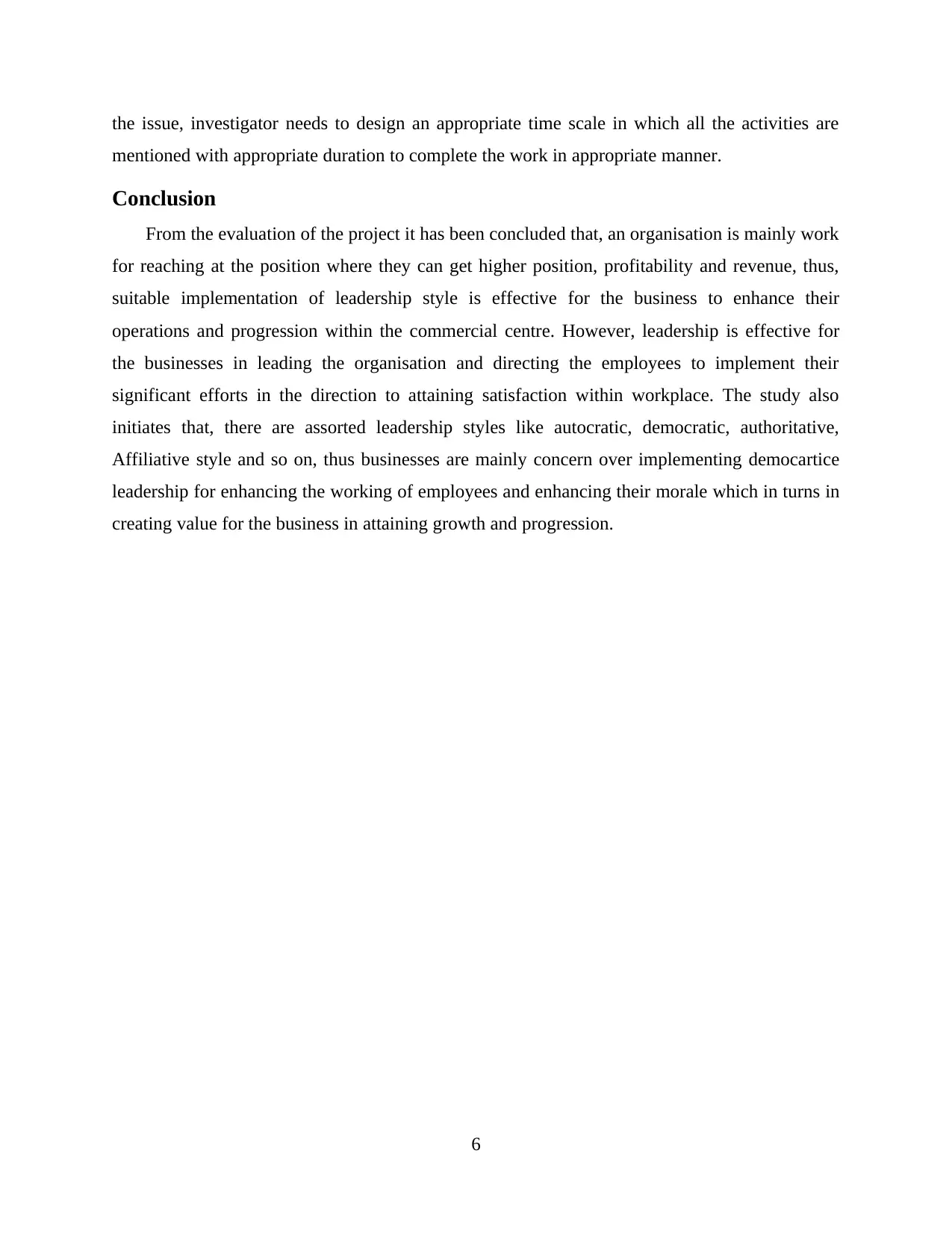
the issue, investigator needs to design an appropriate time scale in which all the activities are
mentioned with appropriate duration to complete the work in appropriate manner.
Conclusion
From the evaluation of the project it has been concluded that, an organisation is mainly work
for reaching at the position where they can get higher position, profitability and revenue, thus,
suitable implementation of leadership style is effective for the business to enhance their
operations and progression within the commercial centre. However, leadership is effective for
the businesses in leading the organisation and directing the employees to implement their
significant efforts in the direction to attaining satisfaction within workplace. The study also
initiates that, there are assorted leadership styles like autocratic, democratic, authoritative,
Affiliative style and so on, thus businesses are mainly concern over implementing democartice
leadership for enhancing the working of employees and enhancing their morale which in turns in
creating value for the business in attaining growth and progression.
6
mentioned with appropriate duration to complete the work in appropriate manner.
Conclusion
From the evaluation of the project it has been concluded that, an organisation is mainly work
for reaching at the position where they can get higher position, profitability and revenue, thus,
suitable implementation of leadership style is effective for the business to enhance their
operations and progression within the commercial centre. However, leadership is effective for
the businesses in leading the organisation and directing the employees to implement their
significant efforts in the direction to attaining satisfaction within workplace. The study also
initiates that, there are assorted leadership styles like autocratic, democratic, authoritative,
Affiliative style and so on, thus businesses are mainly concern over implementing democartice
leadership for enhancing the working of employees and enhancing their morale which in turns in
creating value for the business in attaining growth and progression.
6
⊘ This is a preview!⊘
Do you want full access?
Subscribe today to unlock all pages.

Trusted by 1+ million students worldwide
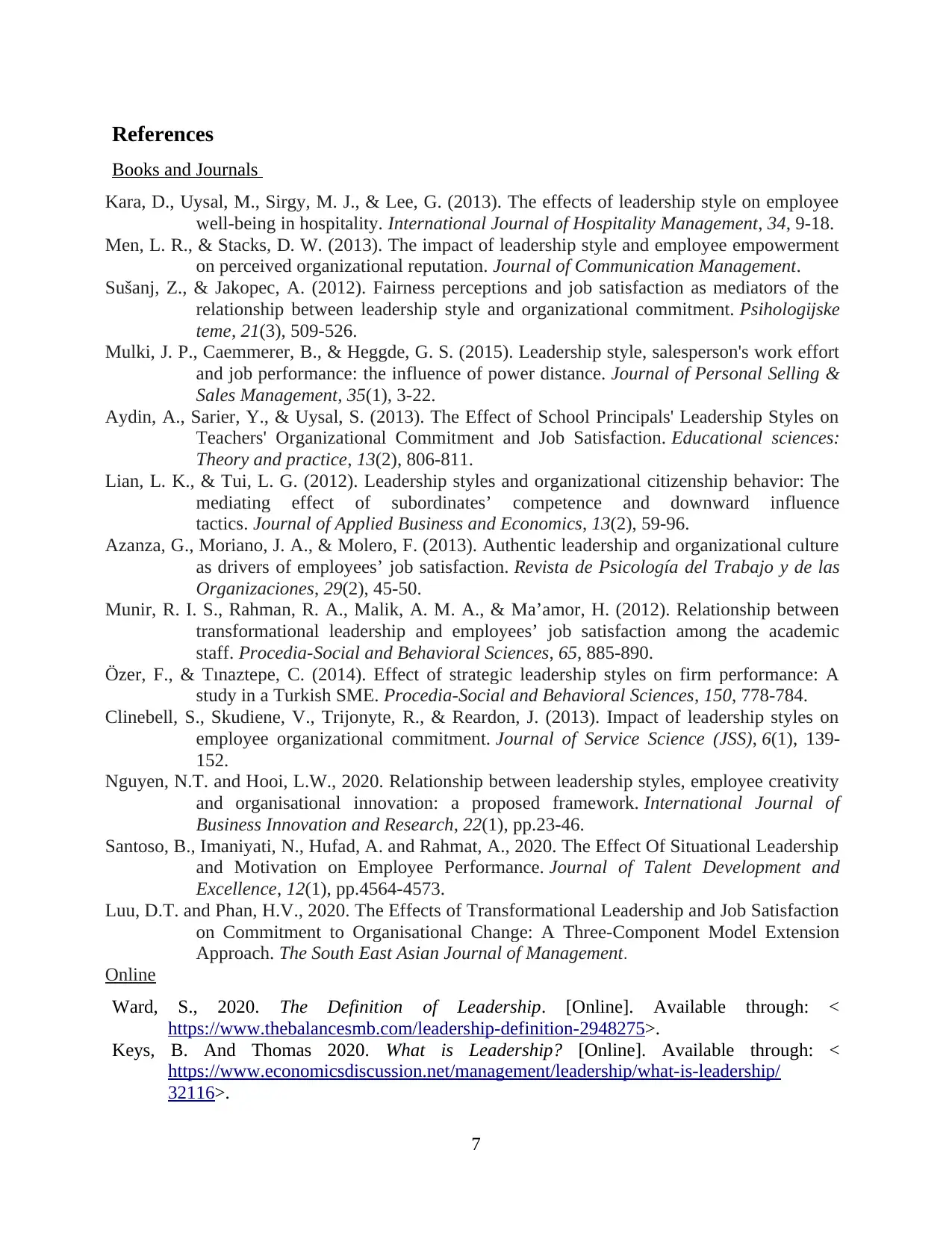
References
Books and Journals
Kara, D., Uysal, M., Sirgy, M. J., & Lee, G. (2013). The effects of leadership style on employee
well-being in hospitality. International Journal of Hospitality Management, 34, 9-18.
Men, L. R., & Stacks, D. W. (2013). The impact of leadership style and employee empowerment
on perceived organizational reputation. Journal of Communication Management.
Sušanj, Z., & Jakopec, A. (2012). Fairness perceptions and job satisfaction as mediators of the
relationship between leadership style and organizational commitment. Psihologijske
teme, 21(3), 509-526.
Mulki, J. P., Caemmerer, B., & Heggde, G. S. (2015). Leadership style, salesperson's work effort
and job performance: the influence of power distance. Journal of Personal Selling &
Sales Management, 35(1), 3-22.
Aydin, A., Sarier, Y., & Uysal, S. (2013). The Effect of School Principals' Leadership Styles on
Teachers' Organizational Commitment and Job Satisfaction. Educational sciences:
Theory and practice, 13(2), 806-811.
Lian, L. K., & Tui, L. G. (2012). Leadership styles and organizational citizenship behavior: The
mediating effect of subordinates’ competence and downward influence
tactics. Journal of Applied Business and Economics, 13(2), 59-96.
Azanza, G., Moriano, J. A., & Molero, F. (2013). Authentic leadership and organizational culture
as drivers of employees’ job satisfaction. Revista de Psicología del Trabajo y de las
Organizaciones, 29(2), 45-50.
Munir, R. I. S., Rahman, R. A., Malik, A. M. A., & Ma’amor, H. (2012). Relationship between
transformational leadership and employees’ job satisfaction among the academic
staff. Procedia-Social and Behavioral Sciences, 65, 885-890.
Özer, F., & Tınaztepe, C. (2014). Effect of strategic leadership styles on firm performance: A
study in a Turkish SME. Procedia-Social and Behavioral Sciences, 150, 778-784.
Clinebell, S., Skudiene, V., Trijonyte, R., & Reardon, J. (2013). Impact of leadership styles on
employee organizational commitment. Journal of Service Science (JSS), 6(1), 139-
152.
Nguyen, N.T. and Hooi, L.W., 2020. Relationship between leadership styles, employee creativity
and organisational innovation: a proposed framework. International Journal of
Business Innovation and Research, 22(1), pp.23-46.
Santoso, B., Imaniyati, N., Hufad, A. and Rahmat, A., 2020. The Effect Of Situational Leadership
and Motivation on Employee Performance. Journal of Talent Development and
Excellence, 12(1), pp.4564-4573.
Luu, D.T. and Phan, H.V., 2020. The Effects of Transformational Leadership and Job Satisfaction
on Commitment to Organisational Change: A Three-Component Model Extension
Approach. The South East Asian Journal of Management.
Online
Ward, S., 2020. The Definition of Leadership. [Online]. Available through: <
https://www.thebalancesmb.com/leadership-definition-2948275>.
Keys, B. And Thomas 2020. What is Leadership? [Online]. Available through: <
https://www.economicsdiscussion.net/management/leadership/what-is-leadership/
32116>.
7
Books and Journals
Kara, D., Uysal, M., Sirgy, M. J., & Lee, G. (2013). The effects of leadership style on employee
well-being in hospitality. International Journal of Hospitality Management, 34, 9-18.
Men, L. R., & Stacks, D. W. (2013). The impact of leadership style and employee empowerment
on perceived organizational reputation. Journal of Communication Management.
Sušanj, Z., & Jakopec, A. (2012). Fairness perceptions and job satisfaction as mediators of the
relationship between leadership style and organizational commitment. Psihologijske
teme, 21(3), 509-526.
Mulki, J. P., Caemmerer, B., & Heggde, G. S. (2015). Leadership style, salesperson's work effort
and job performance: the influence of power distance. Journal of Personal Selling &
Sales Management, 35(1), 3-22.
Aydin, A., Sarier, Y., & Uysal, S. (2013). The Effect of School Principals' Leadership Styles on
Teachers' Organizational Commitment and Job Satisfaction. Educational sciences:
Theory and practice, 13(2), 806-811.
Lian, L. K., & Tui, L. G. (2012). Leadership styles and organizational citizenship behavior: The
mediating effect of subordinates’ competence and downward influence
tactics. Journal of Applied Business and Economics, 13(2), 59-96.
Azanza, G., Moriano, J. A., & Molero, F. (2013). Authentic leadership and organizational culture
as drivers of employees’ job satisfaction. Revista de Psicología del Trabajo y de las
Organizaciones, 29(2), 45-50.
Munir, R. I. S., Rahman, R. A., Malik, A. M. A., & Ma’amor, H. (2012). Relationship between
transformational leadership and employees’ job satisfaction among the academic
staff. Procedia-Social and Behavioral Sciences, 65, 885-890.
Özer, F., & Tınaztepe, C. (2014). Effect of strategic leadership styles on firm performance: A
study in a Turkish SME. Procedia-Social and Behavioral Sciences, 150, 778-784.
Clinebell, S., Skudiene, V., Trijonyte, R., & Reardon, J. (2013). Impact of leadership styles on
employee organizational commitment. Journal of Service Science (JSS), 6(1), 139-
152.
Nguyen, N.T. and Hooi, L.W., 2020. Relationship between leadership styles, employee creativity
and organisational innovation: a proposed framework. International Journal of
Business Innovation and Research, 22(1), pp.23-46.
Santoso, B., Imaniyati, N., Hufad, A. and Rahmat, A., 2020. The Effect Of Situational Leadership
and Motivation on Employee Performance. Journal of Talent Development and
Excellence, 12(1), pp.4564-4573.
Luu, D.T. and Phan, H.V., 2020. The Effects of Transformational Leadership and Job Satisfaction
on Commitment to Organisational Change: A Three-Component Model Extension
Approach. The South East Asian Journal of Management.
Online
Ward, S., 2020. The Definition of Leadership. [Online]. Available through: <
https://www.thebalancesmb.com/leadership-definition-2948275>.
Keys, B. And Thomas 2020. What is Leadership? [Online]. Available through: <
https://www.economicsdiscussion.net/management/leadership/what-is-leadership/
32116>.
7
Paraphrase This Document
Need a fresh take? Get an instant paraphrase of this document with our AI Paraphraser
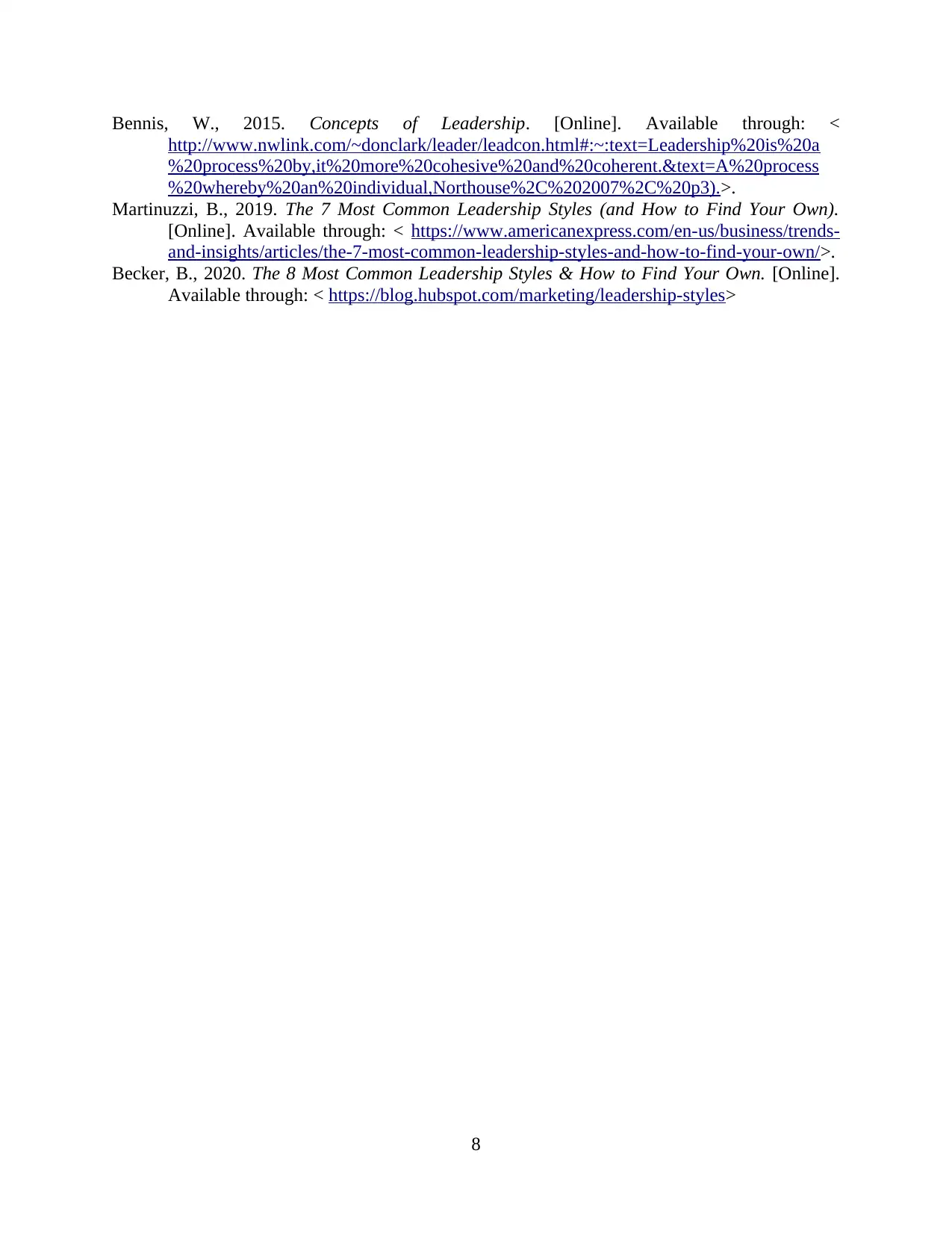
Bennis, W., 2015. Concepts of Leadership. [Online]. Available through: <
http://www.nwlink.com/~donclark/leader/leadcon.html#:~:text=Leadership%20is%20a
%20process%20by,it%20more%20cohesive%20and%20coherent.&text=A%20process
%20whereby%20an%20individual,Northouse%2C%202007%2C%20p3).>.
Martinuzzi, B., 2019. The 7 Most Common Leadership Styles (and How to Find Your Own).
[Online]. Available through: < https://www.americanexpress.com/en-us/business/trends-
and-insights/articles/the-7-most-common-leadership-styles-and-how-to-find-your-own/>.
Becker, B., 2020. The 8 Most Common Leadership Styles & How to Find Your Own. [Online].
Available through: < https://blog.hubspot.com/marketing/leadership-styles>
8
http://www.nwlink.com/~donclark/leader/leadcon.html#:~:text=Leadership%20is%20a
%20process%20by,it%20more%20cohesive%20and%20coherent.&text=A%20process
%20whereby%20an%20individual,Northouse%2C%202007%2C%20p3).>.
Martinuzzi, B., 2019. The 7 Most Common Leadership Styles (and How to Find Your Own).
[Online]. Available through: < https://www.americanexpress.com/en-us/business/trends-
and-insights/articles/the-7-most-common-leadership-styles-and-how-to-find-your-own/>.
Becker, B., 2020. The 8 Most Common Leadership Styles & How to Find Your Own. [Online].
Available through: < https://blog.hubspot.com/marketing/leadership-styles>
8
1 out of 11
Related Documents
Your All-in-One AI-Powered Toolkit for Academic Success.
+13062052269
info@desklib.com
Available 24*7 on WhatsApp / Email
![[object Object]](/_next/static/media/star-bottom.7253800d.svg)
Unlock your academic potential
Copyright © 2020–2026 A2Z Services. All Rights Reserved. Developed and managed by ZUCOL.




